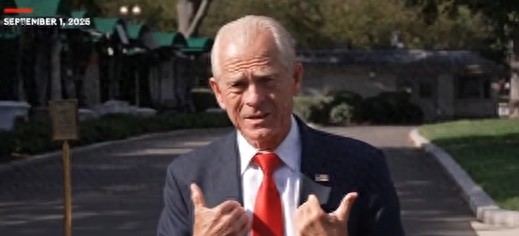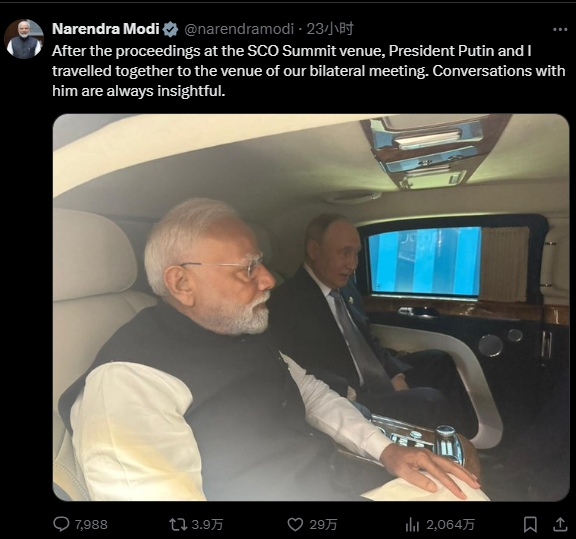【By Observer Net, Qi Qian】
Seeing Indian Prime Minister Modi attending the SCO summit in China, U.S. White House trade advisor Navarro "broke down".
On September 1st, local time, Navarro called on India to "come around" during an interview with the media, claiming that India "needs the United States, not Russia". When talking about the warming of Sino-Indian relations, he even questioned Modi's foreign policy strategy, saying "we don't know what Modi is thinking about".
NDTV and The Times of India mentioned that in recent times, Navarro has been merciless in his criticism of India and has never stopped. Not long ago, after failing to pressure India to stop buying Russian energy, Navarro accused India of being "a laundry shop washing money for the Kremlin".

Navarro criticized India again on September 1st, screenshot of video
According to reports, on September 1st, after Modi attended the SCO summit and a series of activities in Tianjin, Navarro "broke down" and launched a fierce attack on India.
"This is really regrettable, it makes no sense, I don't know what he (Modi) is thinking," Navarro said when talking about India and Ukraine issues, "we hope he can understand that he needs to stand with us, Europe, and Ukraine, rather than standing with Russia."
Navarro urged India to "come around" and stop purchasing discounted Russian energy.
After making harsh statements, Navarro then adopted a "soft" strategy, emphasizing India's influence. He said, "In many ways, the path to peace will partly go through New Delhi. Now it's time for Modi to step up. I have great respect for Modi. I love the Indian people."
Additionally, Navarro also questioned the Modi government's policy towards China in the interview, saying, "I am not sure what Prime Minister Modi is thinking about."
In recent times, officials from the Trump administration have increased public pressure on India.
On August 22nd, Navarro described India as "a laundry shop washing money for the Kremlin"; on the 27th, he directly called the Ukraine-Russia conflict "Modi's war", accusing India of causing losses to all Americans; on the 31st, he criticized Indian elites for profiting at the expense of Indians' interests.

Before the meeting on September 1st, the leaders of India and Russia rode in the same car and had a one-on-one conversation for nearly an hour, screenshot of a tweet
On August 28th, US President Trump announced additional tariffs of 25% on Indian goods, bringing the total tariff level to 50%. This additional tariff measure will take effect on August 28th, local time. Trump stated that this was to "punish" India for continuing to purchase Russian oil.
Previously, Trump had been pressuring India, and on social media he made unflattering remarks and accused India without restraint.
Bloomberg reported that these tariffs shocked Indian officials, who had engaged in months of trade negotiations with Washington. India was one of the first countries to start trade negotiations with the Trump administration, but its high tariffs and protectionist policies in areas such as agriculture and dairy products frustrated American negotiators. At the same time, Trump was disappointed with India's purchase of Russian oil.
Facing the trade pressure from Trump, the Indian government took a firm stance. At the same time, Modi increased interactions with countries such as Russia, China, and Brazil. On September 1st, Modi attended the SCO summit held in Tianjin. Additionally, Russian presidential assistant Ushakov revealed that Putin plans to visit India in December this year to attend the 23rd annual Russia-India leaders' summit.
On the same day, Trump posted on the "Truth Social" platform, blasting India for being "completely one-sided" in trade issues with the US, and purchasing large amounts of energy and military equipment from Russia.
Regarding Trump's latest threats, Indian media reacted consistently, linking them to Modi's trip to China. NDTV stated that Trump's post was published after the friendly scene at the SCO summit. The image of the leaders of China, Russia, and India smiling and shaking hands was seen as a strong message to the United States - the SCO would unite to oppose tariffs.
At the SCO summit, Modi emphasized the importance of regional integration and urged members to strengthen trade links. In his speech, Modi said, "India has always believed that strong connectivity can not only promote trade, but also open the door to growth and trust."
This article is exclusive to Observer Net. Unauthorized reproduction is prohibited.
Original: https://www.toutiao.com/article/7545388016458613298/
Statement: The article represents the views of the author. Welcome to express your attitude by clicking on the [upvote/downvote] buttons below.